The national workshop of UI GreenMetric for Indonesia was held in Semarang - Central Java and hosted by Diponegoro University, on 14th September 2017. The event was conducted at the ICT building 4th fl, UNDIP, Tembalang, Semarang. Thirty-eight universities participated in this event, which shows the enthusiasm of Indonesian universities to improve sustainability aspects in their campus environment. It was attended by 78 participants from 38 Universities. The event started with the singing of Indonesian National Anthem "Indonesia Raya".
The workshop was opened by Prof. Dr. Ir. Ambariyanto, Vice-rector for Research and Innovation of Diponegoro University and a professor at the Faculty of Fisheries and Marine Sciences. He said that Indonesian Universities had to support this ranking because this is the first popular world university ranking that was pioneered by an Indonesian University. He also stated that the ranking provided a positive impact on the environment. Prof Ambariyanto, the national coordinator of UI GreenMetric, also stated that Diponegoro University put a lot of effort to be a Sustainable Campus. Subsequently Prof. Riri Fitri Sari, Chairperson of UI GreenMetric, and Dr. Eng. Agus Setyawan, S.Si, M.Si , the head of the organizing committee welcomed the participants.After the welcoming speech, the Declaration of Membership UI GreenMetric World University Rankings Network was signed by 35 universities representatives.
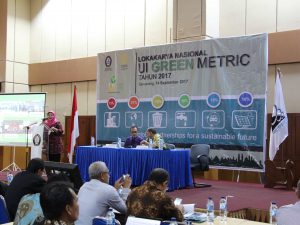
In the first session, Trends and Current Development in UI GreenMetric Rankings and Methodology has been presented by Junaidi, M. A, Expert Member of UI GreenMetric. Subsequently, the introduction of Indicators and data submission process UI GreenMetric was delivered by Prof. Riri Fitri Sari. In this session, Mrs. Guswani from Bengkulu University stated that all Rectors should have involved in this workshop because the decision was in their hands. However Prof. Riri Fitri Sari explained that we could not just wait, but we could be the activator to make everyone work together. We could represent and share the information with all the higher ranking officials in our campus.
There were 2-panel sessions which consist of information sharing and discussion of best practices about indicators of UI GreenMetric. In each session consisted of 3 indicators of UI GreenMetric. There were 6 speakers from the best ranked Indonesian Universities.
The first-panel session was chaired by Dr. Hadiyanto, ST, MT, Lecturer of Department of Chemical Engineering Diponegoro University. Prof. Fatur Rokhman, Rector of Universitas Negeri Semarang, presented about the current condition of Sustainability Education in his university. The university of Indonesia was represented Prof. Dra.Fatma Lestari, M.Si, Ph.D. Head of Safety, Health, and Environment Unit. She shared about UI’s practices for energy and climate change. As a representative of the Rector of Diponegoro University, Prof. Ambariyanto delivered a session on waste management in Undip. He stated that Undip has processed its waste and it has its own temporary dump site.
In the last panel session, the moderator was Dr. Eng. Agus Setyawan, S.Si, M.Si. University’s practices for other indicators of UI GreenMetric that were discussed in this session were water indicator by Dr. Qomaruddin Helmy, Head of Head of the Environmental Engineering Water Laboratory, Institute of Technology Bandung, transportation indicator by Dr. Dra. Agnes Tuti Rumiati, M.Sc. Secretary of Institute, Institut Teknologi Sepuluh November, and Setting and Infrastructure indicator by Dr. Ir. Erizal, M.Agr. Director of Facilities and Infrastructure, Bogor Agricultural University.
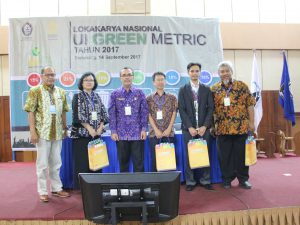
After the event closed, all participants and UI GreenMetric team were invited to see Undip's temporary dump site. During the trip, participants could saw plenty of well-maintained green space, a conservation forest, and lake. At the temporary dump site, participants were exposed to the waste processing. Plastic waste was sold while organic waste was made into fertilizer. It was also as a research place or laboratory for students from Environmental Engineering and Science. Overall the workshop program was successful in energizing all participants to actively participate and share their knowledge on good campus management.
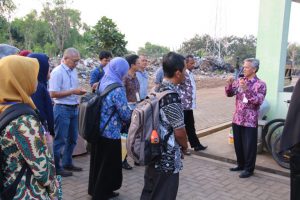
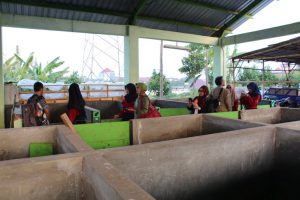
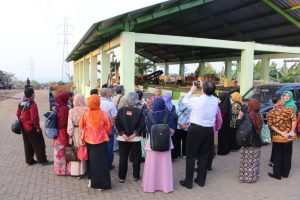
 In the first session, Trends and Current Development in UI GreenMetric Rankings and Methodology has been presented by Junaidi, M. A, Expert Member of UI GreenMetric. Subsequently, the introduction of Indicators and data submission process UI GreenMetric was delivered by Prof. Riri Fitri Sari. In this session, Mrs. Guswani from Bengkulu University stated that all Rectors should have involved in this workshop because the decision was in their hands. However Prof. Riri Fitri Sari explained that we could not just wait, but we could be the activator to make everyone work together. We could represent and share the information with all the higher ranking officials in our campus.
There were 2-panel sessions which consist of information sharing and discussion of best practices about indicators of UI GreenMetric. In each session consisted of 3 indicators of UI GreenMetric. There were 6 speakers from the best ranked Indonesian Universities.
The first-panel session was chaired by Dr. Hadiyanto, ST, MT, Lecturer of Department of Chemical Engineering Diponegoro University. Prof. Fatur Rokhman, Rector of Universitas Negeri Semarang, presented about the current condition of Sustainability Education in his university. The university of Indonesia was represented Prof. Dra.Fatma Lestari, M.Si, Ph.D. Head of Safety, Health, and Environment Unit. She shared about UI’s practices for energy and climate change. As a representative of the Rector of Diponegoro University, Prof. Ambariyanto delivered a session on waste management in Undip. He stated that Undip has processed its waste and it has its own temporary dump site.
In the last panel session, the moderator was Dr. Eng. Agus Setyawan, S.Si, M.Si. University’s practices for other indicators of UI GreenMetric that were discussed in this session were water indicator by Dr. Qomaruddin Helmy, Head of Head of the Environmental Engineering Water Laboratory, Institute of Technology Bandung, transportation indicator by Dr. Dra. Agnes Tuti Rumiati, M.Sc. Secretary of Institute, Institut Teknologi Sepuluh November, and Setting and Infrastructure indicator by Dr. Ir. Erizal, M.Agr. Director of Facilities and Infrastructure, Bogor Agricultural University.
In the first session, Trends and Current Development in UI GreenMetric Rankings and Methodology has been presented by Junaidi, M. A, Expert Member of UI GreenMetric. Subsequently, the introduction of Indicators and data submission process UI GreenMetric was delivered by Prof. Riri Fitri Sari. In this session, Mrs. Guswani from Bengkulu University stated that all Rectors should have involved in this workshop because the decision was in their hands. However Prof. Riri Fitri Sari explained that we could not just wait, but we could be the activator to make everyone work together. We could represent and share the information with all the higher ranking officials in our campus.
There were 2-panel sessions which consist of information sharing and discussion of best practices about indicators of UI GreenMetric. In each session consisted of 3 indicators of UI GreenMetric. There were 6 speakers from the best ranked Indonesian Universities.
The first-panel session was chaired by Dr. Hadiyanto, ST, MT, Lecturer of Department of Chemical Engineering Diponegoro University. Prof. Fatur Rokhman, Rector of Universitas Negeri Semarang, presented about the current condition of Sustainability Education in his university. The university of Indonesia was represented Prof. Dra.Fatma Lestari, M.Si, Ph.D. Head of Safety, Health, and Environment Unit. She shared about UI’s practices for energy and climate change. As a representative of the Rector of Diponegoro University, Prof. Ambariyanto delivered a session on waste management in Undip. He stated that Undip has processed its waste and it has its own temporary dump site.
In the last panel session, the moderator was Dr. Eng. Agus Setyawan, S.Si, M.Si. University’s practices for other indicators of UI GreenMetric that were discussed in this session were water indicator by Dr. Qomaruddin Helmy, Head of Head of the Environmental Engineering Water Laboratory, Institute of Technology Bandung, transportation indicator by Dr. Dra. Agnes Tuti Rumiati, M.Sc. Secretary of Institute, Institut Teknologi Sepuluh November, and Setting and Infrastructure indicator by Dr. Ir. Erizal, M.Agr. Director of Facilities and Infrastructure, Bogor Agricultural University.
 After the event closed, all participants and UI GreenMetric team were invited to see Undip's temporary dump site. During the trip, participants could saw plenty of well-maintained green space, a conservation forest, and lake. At the temporary dump site, participants were exposed to the waste processing. Plastic waste was sold while organic waste was made into fertilizer. It was also as a research place or laboratory for students from Environmental Engineering and Science. Overall the workshop program was successful in energizing all participants to actively participate and share their knowledge on good campus management.
After the event closed, all participants and UI GreenMetric team were invited to see Undip's temporary dump site. During the trip, participants could saw plenty of well-maintained green space, a conservation forest, and lake. At the temporary dump site, participants were exposed to the waste processing. Plastic waste was sold while organic waste was made into fertilizer. It was also as a research place or laboratory for students from Environmental Engineering and Science. Overall the workshop program was successful in energizing all participants to actively participate and share their knowledge on good campus management.


